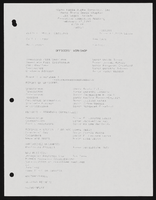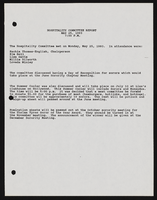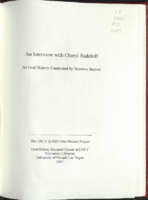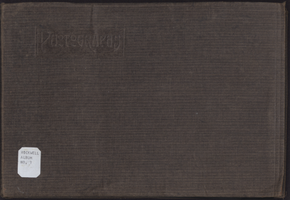Search the Special Collections and Archives Portal
Search Results

Alpha Kappa Alpha Sorority, Theta Theta Omega Chapter executive committee agenda
Date
Archival Collection
Description
From the Alpha Kappa Alpha Sorority, Incorporated, Theta Theta Omega Chapter Records (MS-01014) -- Chapter records file.
Text

Alpha Kappa Alpha Sorority, Theta Theta Omega Chapter hospitality committee report
Date
Archival Collection
Description
From the Alpha Kappa Alpha Sorority, Incorporated, Theta Theta Omega Chapter Records (MS-01014) -- Chapter records file.
Text
Rozita Lee oral history interviews
Identifier
Abstract
Oral history interviews with Rozita Lee conducted by Stefani Evans, Cecilia Winchell, Kristel Peralta, Vanessa Concepcion, Jerwin Tiu, and Su Kim Chung on June 1, 2021, April 12, 2022, and May 18, 2023 for Reflections: The Las Vegas Asian American and Pacific Islander Oral History Project. Rozita shares her experiences growing up on a sugar plantation with her family in Hawaii. She talks about the benefits her family received and the "privileged" life she led with her father as the plantation boss, allowing her household to have electricity, plumbing, and a telephone. Rozita discusses her use of Pidgin English amongst her peers and "good English" in her household, and the roles and responsibilities her parents had working on the plantation. She shares what life was like day to day and what she remembers growing up during World War II including hearing air raid sirens and hanging blackout curtains in her home. Rozita also talks about meeting her husband, Clifford Lee, in high school, their marriage in 1979, and how the couple came to move to Las Vegas. In the second interview, Lee discusses pursuing a bachelor's degree at the University of Nevada, Las Vegas (UNLV), working with Governor Miller and Bob Bailey, and her involvement in a Polynesian show at Imperial Palace for eighteen years.
Archival Collection
Elizabeth Harrington Collection of Essays
Identifier
Abstract
This collection contains the original drafts of the thirteen essays that Elizabeth Harrington wrote about her life in early Las Vegas, Nevada. These articles were written from her memory and experiences of life in Las Vegas beginning in the early 1900s, and were published in the Nevadan section of the Las Vegas Review-Journal from 1975-1979.
Archival Collection

Transcript of interview with Cheryl Radeloff by Suzanne Becker, July 27, 2006
Date
Archival Collection
Description
Text

Photograph album 1, Leon Rockwell Collection, circa 1900s-1910s
Date
Archival Collection
Description
Image
Ruby Gordon oral history interview
Identifier
Abstract
Oral history interview with Ruby Gordon conducted by Claytee D. White on October 29, 2004 for the African Americans in Las Vegas: a Collaborative Oral History Project. In this interview, Gordon talks about her birth and early upbringing in Pine Bluff, Arkansas and Las Vegas, Nevada, where her parents moved when she was seven years old. She discusses her parent's decision to move for better opportunities and the kind of work they did, then speaks extensively about her education through high school, her early marriage, and raising six children. She also talks about the difficulties that mothers faced while trying to work and raise children, especially those with health issues. Later she talks about her involvement with the Elks fraternal organization and explains that there were different lodges for whites and Blacks, based primarily on location, the lodges regularly interacted and worked together on civic and charity programs. Finally, she expands on her own work history in early childhood education, working for the state, and for Child Haven.
Archival Collection
Roberta Sabbath oral history interview
Identifier
Abstract
Oral history interview with Roberta Sabbath conducted by Barbara Tabach on April 27, 2015 for the Southern Nevada Jewish Heritage Project. Sabbath discusses moving to Las Vegas, Nevada in the late 1960s, her involvement with organizing University of Nevada, Las Vegas’ (UNLV) Hillel chapter, and the Hebrew Day School. She also talks about her husband’s, Dennis Sabbath, career as a union attorney, and her career as an UNLV literature professor.
Archival Collection
Marisa Rodriguez oral history interview
Identifier
Abstract
Oral history interview with Marisa Rodriguez conducted by Maribel Estrada Calderón, Monserrath Hernández and Claytee D. White for the Latinx Voices of Southern Nevada Oral History Project.
Marisa Rodriguez discusses her childhood and living in North Las Vegas as a teenager; she was born in Chicago, Illinois, moved to Mexico with her family at a young age, and returned to the United States at age 12. She recounts what it was like acclimating to American life, learning English, and studying abroad in Spain before becoming a law student. Marisa attended the William S. Boyd School of Law and is currently a civil litigator in Las Vegas.
Subjects discussed include: La Voz Hispanic/Latino Law Students Association at the William S. Boyd School of Law; Huellas mentorship program.
Archival Collection

Transcript of interview with Natalie Wolf by Barbara Tabach, October 22, 2016
Date
Archival Collection
Description
During this interview, Natalie shares stories of operating the bus station, a brief ownership of Commercial Deli (1987-1990), and her long career working collections for the casino industry. Her first position was at the Tropicana Hotel and has worked for MGM Properties, a loyal employee at the Mirage since 1990, starting a few weeks after the casino opened.
Text
